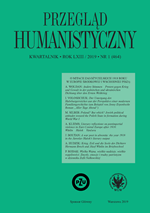Literary Reflections on Postimperial Violence in East-Central Europe after 1918: Wittlin – Hašek – Vančura
Literary Reflections on Postimperial Violence in East-Central Europe after 1918: Wittlin – Hašek – Vančura
Author(s): Alfrun KliemsSubject(s): History, Language and Literature Studies, Studies of Literature, Theory of Literature
Published by: Wydawnictwa Uniwersytetu Warszawskiego
Keywords: World War I; Polish Literature; Czech Literature; Jaroslav Hašek; Vladislav Vančura; Józef Wittlin; Fragmentation of Space; Barbarization and Self-Barbarization
Summary/Abstract: This paper discusses questions like the irony of history, the lack of illusions, and the prophecy of violence in three classic World War I novels by Jaroslav Hašek, Vladislav Vančura and Józef Wittlin, written in the decades after 1918. The novels have at least three aspects in common: first, the poetics of each is marked in a compressed way by the style of narrating the assassination in Sarajevo in 1918; second, three picaresque figures – Švejk, Řeka and Niewiadomski, respectively – standing in the centre of each novel; and, third, in addition to the war itself, each novel looks proleptically at its consequences, even if the narrated time does not extend to the end of the war. The paper tries to reflect on the novels as the literature of post-imperialist violence. Rhetorical figures of barbarization and self-barbarization, inversion of subject and object, fragmentation of space are particularly significant in the books, demonstrating the aesthetic processing of the reversal from euphoria, over the end of the war, to frustration, over the continuing violence. More specifically, these figures correspond with a remarkable degree with the unfulfilled peace after 1918.
Journal: Przegląd Humanistyczny
- Issue Year: 464/2019
- Issue No: 1
- Page Range: 65-79
- Page Count: 15
- Language: English
- Content File-PDF

